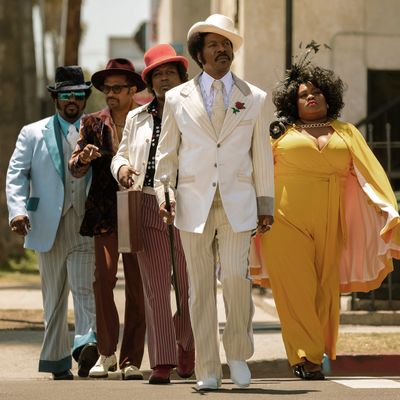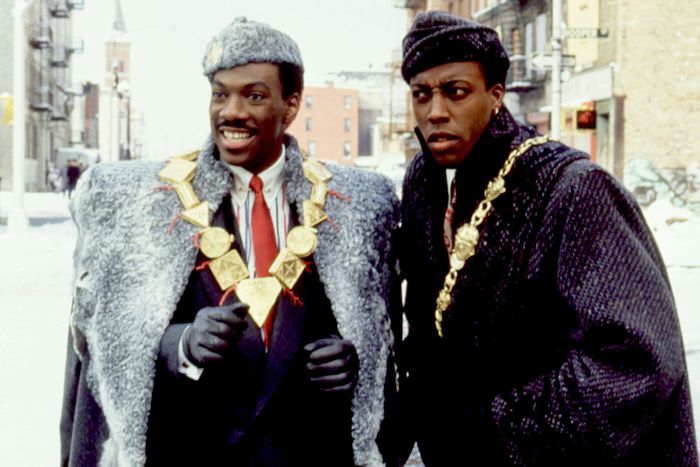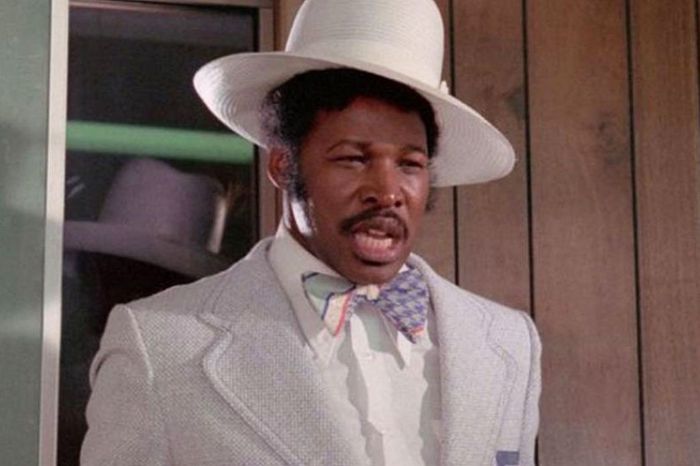
In the new Netflix film Dolemite Is My Name, a dramatization of the real story behind a 1970s blaxploitation classic, Eddie Murphy’s Rudy Ray Moore is faced with the daunting task of performing a sex scene in front of the ragtag crew he’s assembled to bring a soon-to-be-cult movie to life. Moore is a paunchy, middle-aged, borderline sexless man who has nonetheless made a career out of boasting about his sexual prowess, posing nude with models on the covers of his raunchy comedy albums. But now, he’s being asked to illustrate that imagined prowess for the camera. Instead of playing the scene for titillation, Moore decides to lean into the joke. He rocks the bed violently, causing pictures to bounce up and down on the walls. A piece of the ceiling falls. Dolemite’s libidinous power is off the charts. He might not look like much, but under the right circumstances, he can make the Earth move.
Black masculinity in movies, especially comedies, was and remains a dicey subject. When the original Dolemite was released in 1975, only eight years had passed since Guess Who’s Coming to Dinner became the rare Hollywood movie to depict an interracial relationship. In that film, Sidney Poitier plays an eerily perfect example of an upper-class African-American man, nary a rough edge to be found. The image of John Prentice would go on to define black sexuality in pop culture for years after, and while the line from Poitier to Will Smith is not a clean one, an idea persisted: for a black actor in 20th century Hollywood, placidity was the key. Otherwise, you don’t get the girl. Outside of romantic dramas, many of the great black comedic film actors of the era were pulled into this cinematic paradigm. Richard Pryor was a massive star for years, but in movies like Brewster’s Millions, the white female co-lead was his cheery confidant rather than a lover. Before Bill Cosby was outed as a sexual predator, he appeared in movies like Leonard: Part 6 and Ghost Dad, where he was a doddering parental figure rather than a romantic lead.
In the pre–My Name is Dolemite career of Eddie Murphy, we see how hesitant Hollywood and audiences alike could be when it comes to black male sexuality on screen. You can count the number of sex scenes he’s performed on one hand — largely as the romantic lead in unpopular fare like Vampire in Brooklyn or Boomerang. Audiences never quite embraced his virility the way they fell for his wit, energy, and sexless charm in Beverly Hills Cop or Trading Places. The box-office grosses for Murphy’s romantic films paled in comparison to the mega-bucks successes of movies like 48 Hours. In Trading Places, it’s not Murphy but Dan Aykroyd who gets the girl at the end. In Beverly Hills Cop, Axel Foley is “just a friend,” eliminating any chance of him bedding the leading lady when the bad guys are all dead. Murphy’s biggest hits were R-rated films filled with provocative language, nudity, and violence, yet sex was less than an afterthought. Axel Foley could go to a strip club and crack wise around countless exposed breasts, but it was as if these things were happening behind glass.
The black movie stars that came after Murphy, now 58, had more success developing romantic personas. Namely, Will Smith, who could sublimate any threatening aspects of his persona to seduce Margot Robbie in Focus. Predominantly black romantic comedies like The Best Man began to spring up with more frequency. While all of this was happening, Murphy was either slathering himself in makeup for kids’ movies or struggling to keep up with Smith, now 51, in sci-fi comedies like The Adventures of Pluto Nash.
Murphy’s superpower was extreme confidence and unflappable wit. Smith has that, but he also possesses a remarkable capacity for vulnerability; he’s not especially tough or particularly menacing. Above all, he feels safe. In Coming to America, arguably Eddie’s most successful attempt at being a romantic hero, he has to play a naive fish-out-of-water to be credibly romantic to moviegoers. His inherent street smarts are negated by how alien his character is made to feel. The film was surely a triumphant moment in Murphy’s career, but the part was far from the flashy talker people fell in love with on SNL or in his stand-up concert films.
Part of what makes Dolemite Is My Name so revelatory is that it allows Murphy to play a character who was, unequivocally, sexual over four decades ago. It was, after all, the blaxploitation films of the 1970s that took Poitier’s portrayal of acceptable blackness and blew it all to hell. These movies were violent, crass, and explicit. They gave white audiences a glimpse of a different kind of hero. Dolemite, as with contemporaneous characters like Shaft, demanded a sexual gaze. But by the time Eddie Murphy became the most recognizable black face in late 1980s movies, mainstream acceptance of those transgressive stories had waned significantly. Movies reflected the new Reagan-era conservatism that gave us the non-threatening, buttoned-up Cosby Show.
Only in blaxploitation could black sexuality be truly unleashed. Of course, those blaxploitation characters usually had to be pimps or lotharios hopping from bed to bed. The original Dolemite film was about a falsely imprisoned pimp and nightclub owner coming back to reclaim his territory. His only real ally is another, female pimp named Queen Bee. Romance can be beside the point or blatantly irrelevant in blaxploitation; it’s sex as trade or sex as conquest, which plays into damaging stereotypes about black men that still persist. Nonetheless, in films like Dolemite and Superfly, there was something revolutionary — which Murphy brings to the fore. In a way, Murphy playing Rudy Ray Moore playing Dolemite presents an alternate universe version of the actor, who he might have been in an era when black sexuality was in vogue.
Because the role of Dolemite represents the antithesis of what Murphy did in Coming to America. (Murphy will be reprising both the roles of Akeem and Axel Foley in 2020’s Coming 2 America and the not-yet-dated Beverly Hills Cop 4, respectively.) Dolemite is brash, angry, clever, and unflappable, prepared to be the baddest, coolest person in any room. That’s who Eddie Murphy was in the 1980s, and that’s often what people expect from black men in America. It’s worth nothing that Moore himself was never married and didn’t have any children, which led to rumors that he might have been gay. If he was, it was a cruelly inhospitable time to live as an out gay man, particularly while portraying Dolemite. (Remember that comics like Murphy often used homophobic material to get cheap laughs in the ‘80s.) Black masculinity can be so retrograde, reactionary, and intolerant in part because of what we wrongfully deem to be our most redeeming qualities; our edge, our hipness, and our confidence is what some outsiders have decided gives us our worth. Part of the joke of the bed scene in Dolemite is that it dramatizes exactly what white audiences are afraid of, that black men are sexual dynamos that can make the ceiling collapse in your bedroom.
Dolemite Is My Name is Eddie Murphy reclaiming an aspect of himself that he seemed to have lost, that incredibly potent swagger that made him both inescapably magnetic and undeniably threatening. It’s what made him one of the greatest, if not the greatest, black movie stars. It was when he downplayed it or saw it as a hindrance that his influence faltered. Playing Rudy Ray Moore allows Murphy, for once, to wield black masculinity without fear, to make the earth move with his power.



